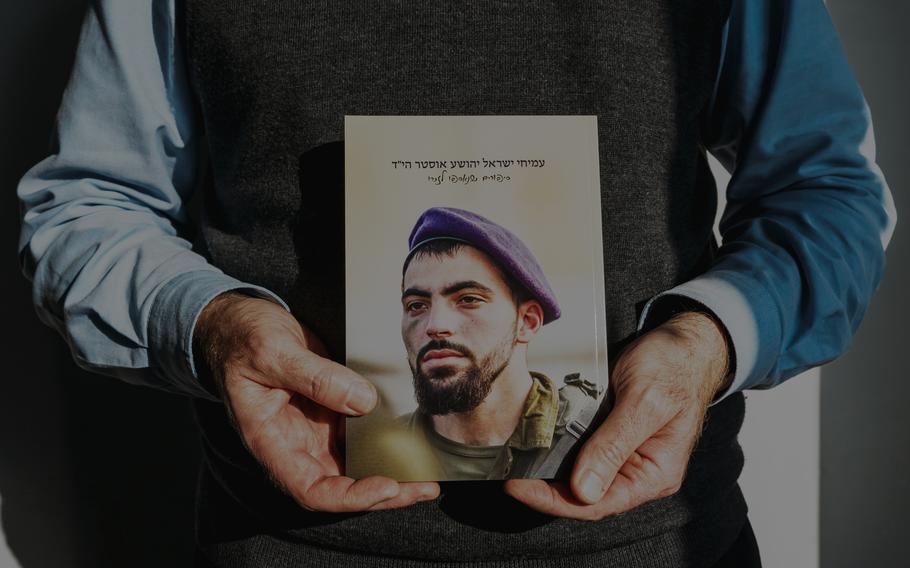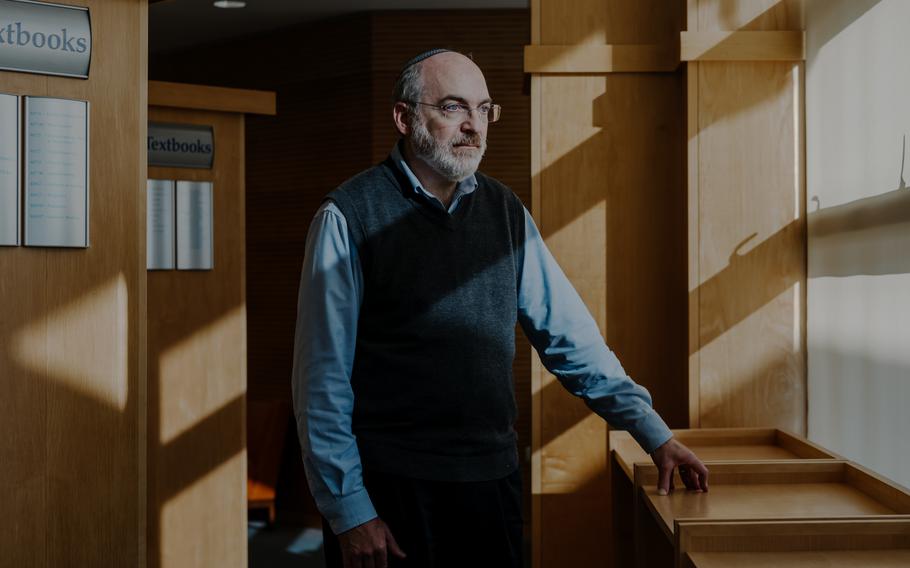Middle East
The American citizens fighting and dying for Israel in the Gaza war
The Washington Post February 22, 2024

Howard Oster with Amichai’s photo. The family moved from Cleveland to Israel when Amichai was 1 year old, and he had been visiting the United States on Oct. 7, 2023. (Ofir Berman for The Washington Post)
JERUSALEM — Amichai Oster was in Salt Lake City when Hamas attacked southern Israel on Oct 7. Within days, the 24-year-old was on a plane, among thousands of Americans and American Israelis who rushed to join the fight in Gaza. Three months later, he was dead.
Oster was killed when an explosion hit his combat unit in northern Gaza on New Year’s Day, one of at least 23 American citizens to be killed in recent months while serving in the Israeli military or police, according to the U.S. Embassy in Jerusalem. Though U.S. citizens make up less than 2% of Israel’s population, they account for almost 10% of the country’s war dead since the start of the ground invasion in Gaza.
“I didn’t serve in the army,” said Howard Oster, Amichai’s father, who moved his family from Cleveland to Israel in 2000. “But my sons did. We feel the need to have a good army, and my kids felt very strongly to be part of that.”
The Washington Post talked to three families of U.S. citizens killed while fighting for Israel. They were united in their fierce commitment to the Jewish state, having found in their adoptive country an identity that largely transcended their American passport.
U.S. immigrants are prevalent among religious, nationalist and Zionist communities in Israel and the West Bank, experts said. Families tend to be large and often have multiple members serving in the military or as reservists. An estimated 23,380 American citizens currently serve in Israeli ranks, according to Israel Defense Forces.
“It’s not surprising to see Americans disproportionately represented,” said Sara Hirschhorn, a visiting professor of history at Haifa University. “Many American Jews who have immigrated to Israel are very idealistic.”
Tens of thousands have come in recent decades, she said, inspired by Zionist or Jewish aspirations they couldn’t fulfill in the United States. Their commitment to Israel and to its military grew deep.
Naftali Yonah Gordon was born in Queens and worked each year at a Zionist summer camp in Pennsylvania.
“Being American is part of our identity,” said Gordon’s wife, Pesi Gordon, whose own mother grew up in New York. “But he was very, very connected to Israel. He gave his life for it.”
Gordon, 32, had been working as a physiotherapist and raising two daughters in Jerusalem when he rejoined his former armored unit after Oct 7. His tank was hit by a missile on Dec. 7.
Oster moved to Israel with his parents and older sisters when he was a year old. The family settled with other relatives in a West Bank settlement.
“We came for Zionism,” said Howard, a physician. “After 2,000 years of yearning for a state, we felt that we had to be part of that.”
Last autumn, Oster completed his military service — mandatory for most Israelis except for ultra-Orthodox and Palestinian citizens — and was making a long swing through the United States, visiting family and national parks, sometimes sleeping in the decommissioned Crown Victoria police car he bought in Boca Raton, Fla.

Howard Oster in the library of the hospital where he works in Tel Aviv. He was at work when he learned this his son Amichai had been killed on New Year’s Day while fighting in the Gaza Strip. (Ofir Berman for The Washington Post)
It took him a week after Oct. 7 to make it back to Israel. Only when his mother, Marcy Oster, a journalist, caught a glimpse of his face on CNN, among Israelis boarding an emergency flight from Los Angeles, were they sure he was on his way — determined to take his place on the front lines.
On Jan. 1, Howard was working at his hospital in Tel Aviv, where he would often hear helicopters arriving with wounded soldiers. But he had heard nothing that day. Then he was called to an office; two soldiers were waiting to deliver the news. Other soldiers met Marcy at the same time. Family and friends in Ohio, Utah and California joined Amichai’s funeral the next day by Zoom.
Twenty-one Americans in IDF units have been killed inside Gaza. Another died along Israel’s northern border with Lebanon, where soldiers exchange fire with Hezbollah militants on a near-daily basis. A 23rd U.S. citizen was killed in Jerusalem while serving in Israel’s border police.
At least 32 Americans were killed during the initial Hamas rampage. At least 11 others were among those taken hostage that day from communities in the south, where numerous American families lived — some of them left-leaning peace activists who came to Israel decades ago after being part of the civil rights and anti-Vietnam War movements. The State Department said six U.S. citizens are still held in Gaza.
Americans in Israel reflect the diversity of the nation itself and its activist culture, “both on the religious right and the secular left,” said Hirschhorn, the history professor.
Hundreds of Palestinian Americans fled from Gaza in the first weeks of the war. None of those who remained have been confirmed to be among the more than 29,000 people killed. The Gaza Health Ministry’s count does not distinguish between civilian and combatant deaths.
But two American teenagers have been killed recently in the West Bank, part of a surge of violence linked to Israeli military raids and settler attacks since Oct. 7.
Wherever they live, Americans in the region have become immersed in an intractable conflict where sudden death has long been a part of life.
Pesi Gordon’s 15-year-old sister, Malki Roth, was killed in the bombing of a Sbarro pizza restaurant in Jerusalem in 2001. Her parents have campaigned for years to have one of the convicted conspirators, a Palestinian woman freed in a 2011 prisoner swap, extradited from Jordan.
“Living here, I felt that was normal,” Gordon said, speaking of her sister’s death a few weeks after her husband’s funeral. “Like, ‘Oh, I guess everybody loses people to tragedy.’ It’s only when you think about it rationally that you realize lightning isn’t supposed to strike twice.”
Binyamin Airley was 4 when his parents moved the family from Long Island. He maintained dual citizenship but seldom wanted to travel to the United States, or anywhere else for that matter, said his father, Robert Airley.
“He never wanted to leave Israel,” Robert said. “He was into the holiness of the land.”
“He was more Israeli than the Israelis,” echoed his mother, Jen Airley, who grew up in Hollywood, Fla.
Airley was on leave from his unit on Oct. 7, spending the Jewish holiday of Sukkot on a West Bank farm where he regularly volunteered. By the evening, he had rejoined his unit, deploying to the small towns where Hamas fighters had killed about 1,200 people.
Bodies were everywhere. Clearing the area of militants took nearly a week.
Airley’s unit was among the first to enter Gaza after the ground offensive began on Oct. 27. Three weeks later, he was one of three Israeli soldiers killed in a firefight in the north.
He was buried on Mount Herzl the next day. Among those who came to sit shiva were dozens of friends and relatives from Texas, Florida, New York and New Jersey.